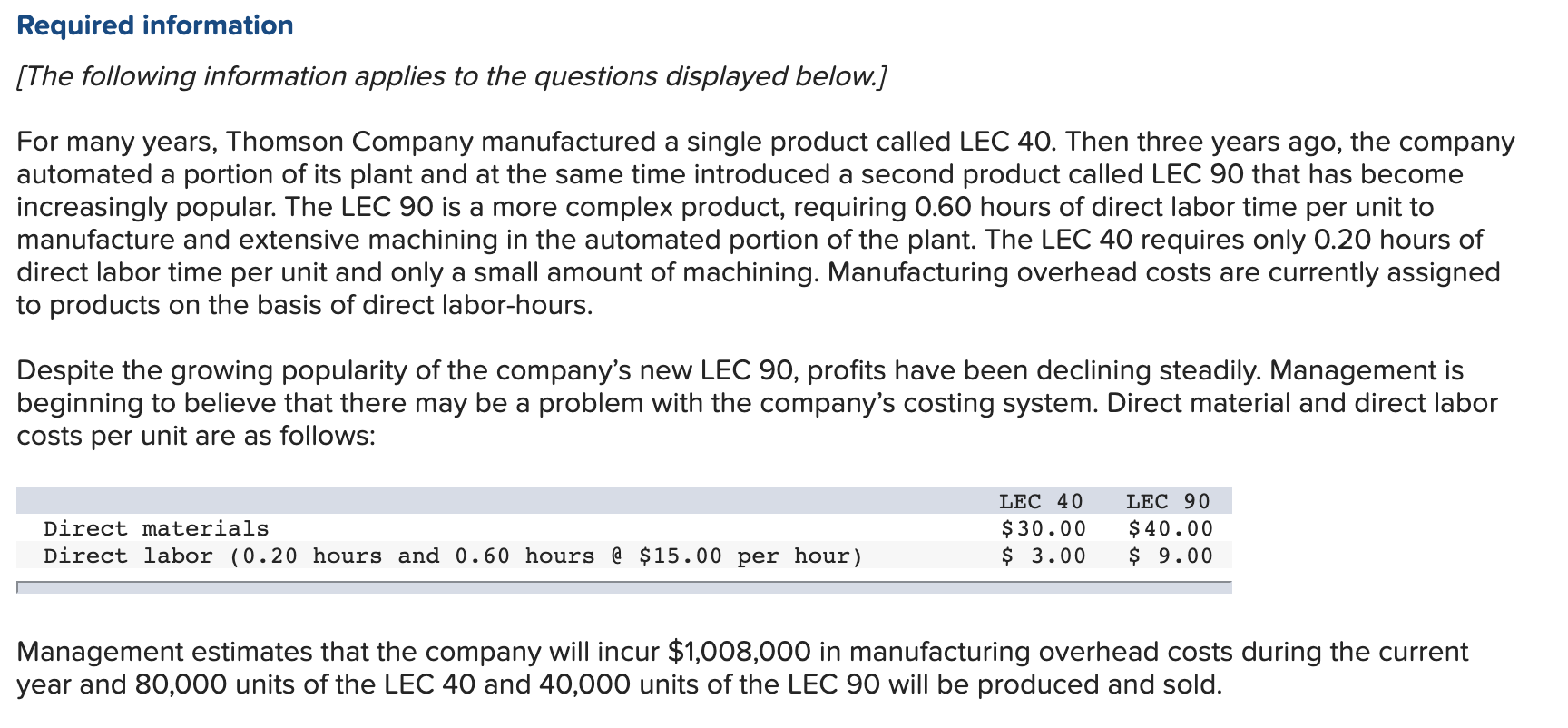
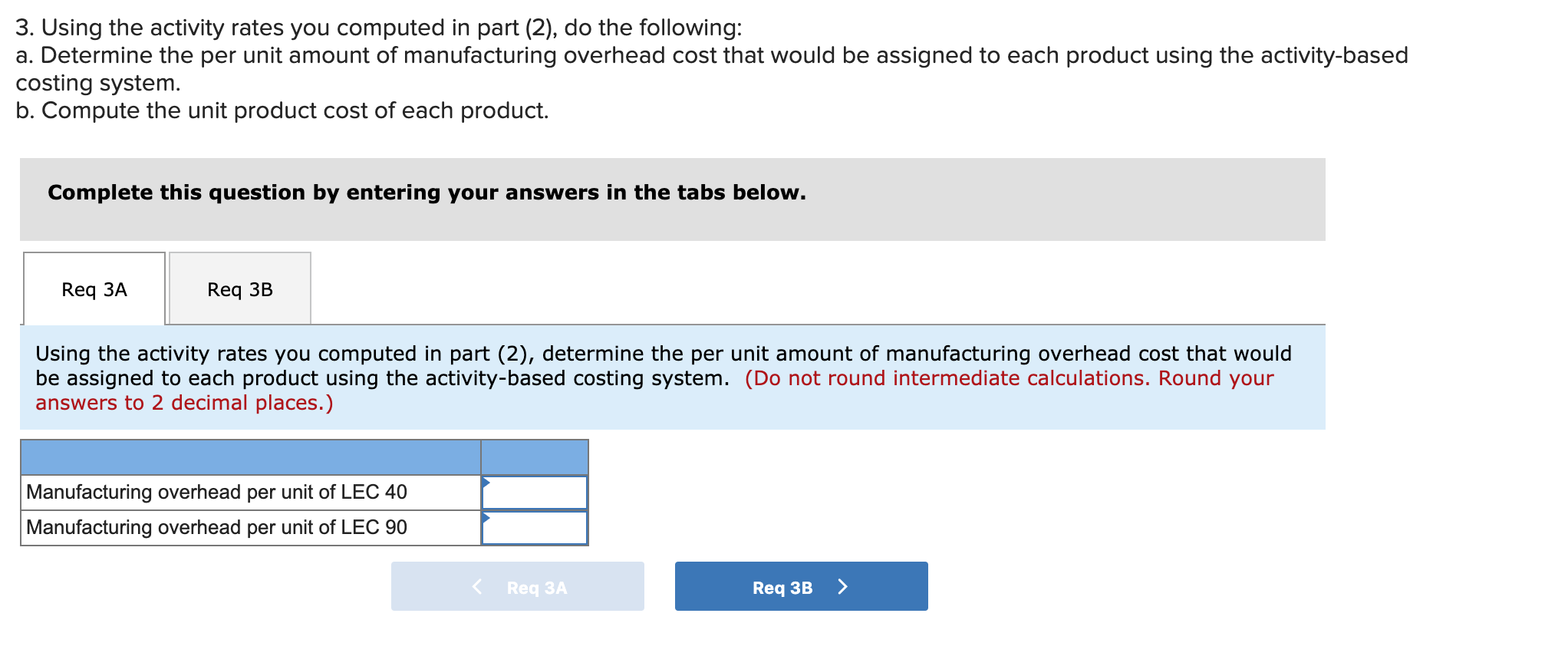
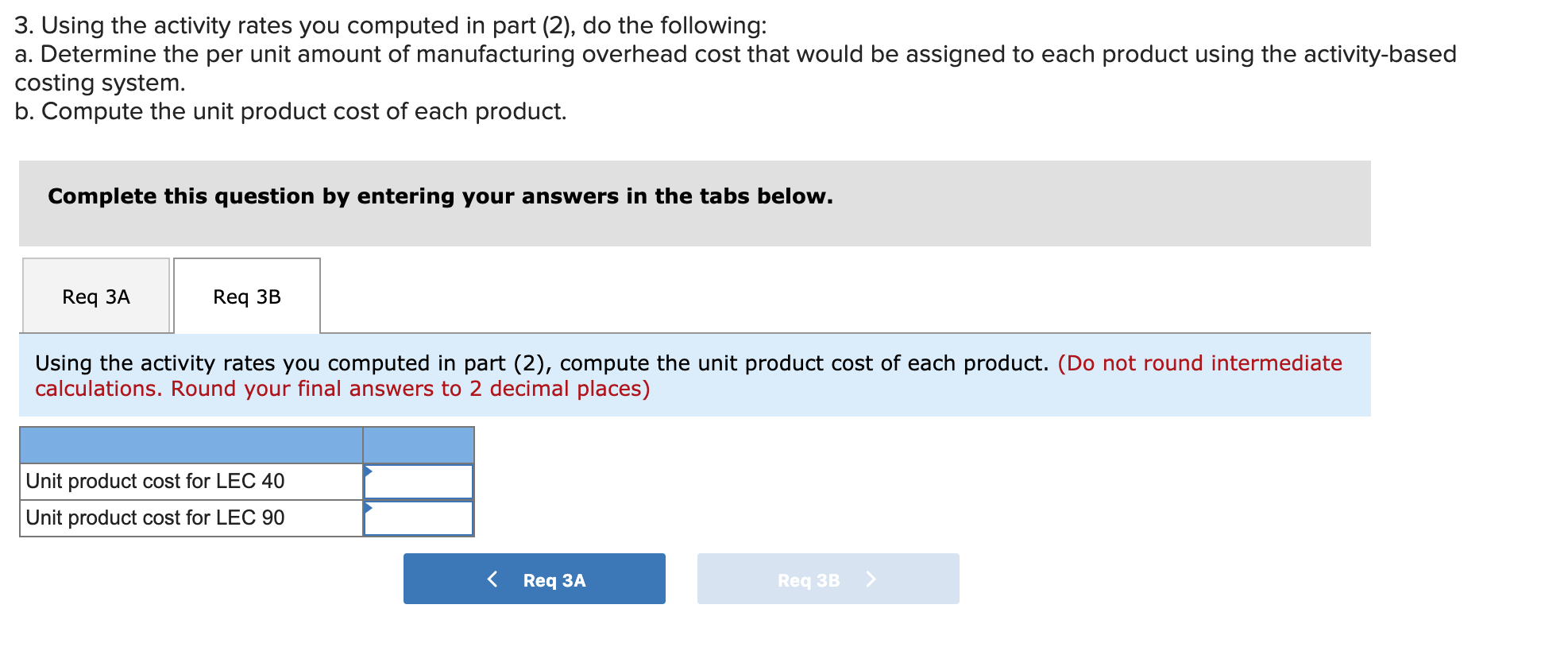 The following images are from part (2):
The following images are from part (2):
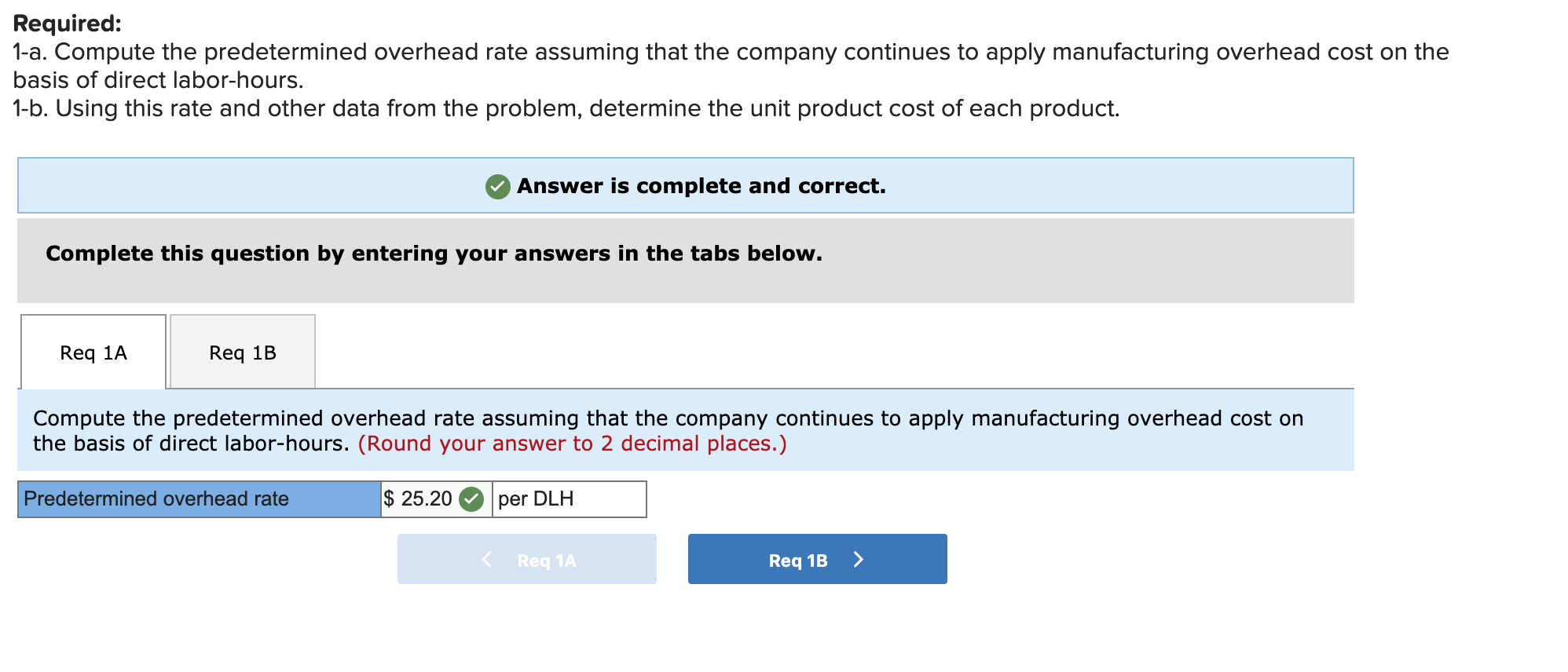
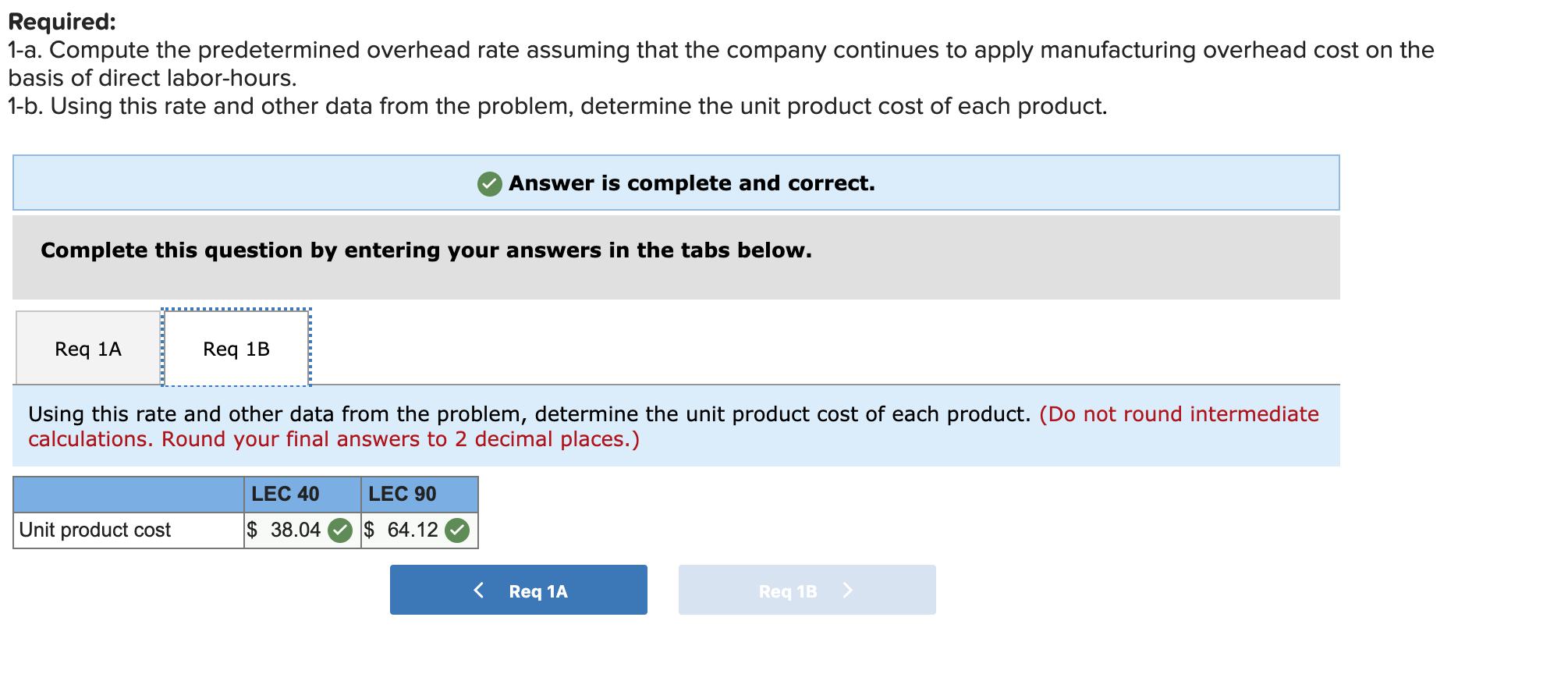
Required information [The following information applies to the questions displayed below.] For many years, Thomson Company manufactured a single product called LEC 40. Then three years ago, the company automated a portion of its plant and at the same time introduced a second product called LEC 90 that has become increasingly popular. The LEC 90 is a more complex product, requiring 0.60 hours of direct labor time per unit to manufacture and extensive machining in the automated portion of the plant. The LEC 40 requires only 0.20 hours of direct labor time per unit and only a small amount of machining. Manufacturing overhead costs are currently assigned to products on the basis of direct labor-hours. Despite the growing popularity of the company's new LEC 90, profits have been declining steadily. Management is beginning to believe that there may be a problem with the company's costing system. Direct material and direct labor costs per unit are as follows: Direct materials Direct labor (0.20 hours and 0.60 hours @ $15.00 per hour) LEC 40 $ 30.00 $ 3.00 LEC 90 $40.00 $ 9.00 Management estimates that the company will incur $1,008,000 in manufacturing overhead costs during the current year and 80,000 units of the LEC 40 and 40,000 units of the LEC 90 will be produced and sold. 3. Using the activity rates you computed in part (2), do the following: a. Determine the per unit amount of manufacturing overhead cost that would be assigned to each product using the activity-based costing system. b. Compute the unit product cost of each product. Complete this question by entering your answers in the tabs below. Req Req 3B Using the activity rates you computed in part (2), determine the per unit amount of manufacturing overhead cost that would be assigned to each product using the activity-based costing system. (Do not round intermediate calculations. Round your answers to 2 decimal places.) Manufacturing overhead per unit of LEC 40 Manufacturing overhead per unit of LEC 90 Req3A Req3B > 3. Using the activity rates you computed in part (2), do the following: a. Determine the per unit amount of manufacturing overhead cost that would be assigned to each product using the activity-based costing system. b. Compute the unit product cost of each product. Complete this question by entering your answers in the tabs below. Req 3A Req 3B Using the activity rates you computed in part (2), compute the unit product cost of each product. (Do not round intermediate calculations. Round your final answers to 2 decimal places) Unit product cost for LEC 40 Unit product cost for LEC 90 Required: 1-a. Compute the predetermined overhead rate assuming that the company continues to apply manufacturing overhead cost on the basis of direct labor-hours. 1-b. Using this rate and other data from the problem, determine the unit product cost of each product. Answer is complete and correct. Complete this question by entering your answers in the tabs below. Req 1A Req 1B Compute the predetermined overhead rate assuming that the company continues to apply manufacturing overhead cost on the basis of direct labor-hours. (Round your answer to 2 decimal places.) Predetermined overhead rate $ 25.20 per DLH | Required: 1-a. Compute the predetermined overhead rate assuming that the company continues to apply manufacturing overhead cost on the basis of direct labor-hours. 1-b. Using this rate and other data from the problem, determine the unit product cost of each product. Answer is complete and correct. Complete this question by entering your answers in the tabs below. Req 1A Req 1B Using this rate and other data from the problem, determine the unit product cost of each product. (Do not round intermediate calculations. Round your final answers to 2 decimal places.) LEC 40 $ 38.04 LEC 90 $ 64.12 Unit product cost Required information [The following information applies to the questions displayed below.] For many years, Thomson Company manufactured a single product called LEC 40. Then three years ago, the company automated a portion of its plant and at the same time introduced a second product called LEC 90 that has become increasingly popular. The LEC 90 is a more complex product, requiring 0.60 hours of direct labor time per unit to manufacture and extensive machining in the automated portion of the plant. The LEC 40 requires only 0.20 hours of direct labor time per unit and only a small amount of machining. Manufacturing overhead costs are currently assigned to products on the basis of direct labor-hours. Despite the growing popularity of the company's new LEC 90, profits have been declining steadily. Management is beginning to believe that there may be a problem with the company's costing system. Direct material and direct labor costs per unit are as follows: Direct materials Direct labor (0.20 hours and 0.60 hours @ $15.00 per hour) LEC 40 $ 30.00 $ 3.00 LEC 90 $40.00 $ 9.00 Management estimates that the company will incur $1,008,000 in manufacturing overhead costs during the current year and 80,000 units of the LEC 40 and 40,000 units of the LEC 90 will be produced and sold. 3. Using the activity rates you computed in part (2), do the following: a. Determine the per unit amount of manufacturing overhead cost that would be assigned to each product using the activity-based costing system. b. Compute the unit product cost of each product. Complete this question by entering your answers in the tabs below. Req Req 3B Using the activity rates you computed in part (2), determine the per unit amount of manufacturing overhead cost that would be assigned to each product using the activity-based costing system. (Do not round intermediate calculations. Round your answers to 2 decimal places.) Manufacturing overhead per unit of LEC 40 Manufacturing overhead per unit of LEC 90 Req3A Req3B > 3. Using the activity rates you computed in part (2), do the following: a. Determine the per unit amount of manufacturing overhead cost that would be assigned to each product using the activity-based costing system. b. Compute the unit product cost of each product. Complete this question by entering your answers in the tabs below. Req 3A Req 3B Using the activity rates you computed in part (2), compute the unit product cost of each product. (Do not round intermediate calculations. Round your final answers to 2 decimal places) Unit product cost for LEC 40 Unit product cost for LEC 90 Required: 1-a. Compute the predetermined overhead rate assuming that the company continues to apply manufacturing overhead cost on the basis of direct labor-hours. 1-b. Using this rate and other data from the problem, determine the unit product cost of each product. Answer is complete and correct. Complete this question by entering your answers in the tabs below. Req 1A Req 1B Compute the predetermined overhead rate assuming that the company continues to apply manufacturing overhead cost on the basis of direct labor-hours. (Round your answer to 2 decimal places.) Predetermined overhead rate $ 25.20 per DLH | Required: 1-a. Compute the predetermined overhead rate assuming that the company continues to apply manufacturing overhead cost on the basis of direct labor-hours. 1-b. Using this rate and other data from the problem, determine the unit product cost of each product. Answer is complete and correct. Complete this question by entering your answers in the tabs below. Req 1A Req 1B Using this rate and other data from the problem, determine the unit product cost of each product. (Do not round intermediate calculations. Round your final answers to 2 decimal places.) LEC 40 $ 38.04 LEC 90 $ 64.12 Unit product cost


 The following images are from part (2):
The following images are from part (2):







